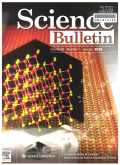- 钛学术文献服务平台 \
- 学术期刊 \
- 基础科学期刊 \
- 自然科学总论期刊 \
- 科学通报(英文版)期刊 \
null
Draft genome of an Aerophobetes bacterium reveals a facultative lifestyle in deep-sea anaerobic sediments
基本信息来源于合作网站,原文需代理用户跳转至来源网站获取
摘要:
Aerophobetes (or CD12) is a recently defined bacterial phylum,of which the metabolic processes and ecological importance remain unclear.In the present study,we obtained the draft genome of an Aerophobetes bacterium TCS1 from saline sediment near the Thuwal cold seep in the Red Sea using a genome binning method.Analysis of 16S rRNA genes of TCS1 and close relatives revealed wide distribution of Aerophobetes in deep-sea sediments.Phylogenetic relationships showed affinity between Aerophobetes TCS1 and some thermophilic bacterial phyla.The genome of TCS1 (at least 1.27 Mbp)contains a full set of genes encoding core metabolic pathways,including glycolysis and pyruvate fermentation to produce acetyl-CoA and acetate.The identification of cross-membrane sugar transporter genes further indicates its potential ability to consume carbohydrates preserved in the sediment under the microbial mat.Aerophobetes bacterium TCS1 therefore probably carried out saccharolytic and fermentative metabolism.The genes responsible for autotrophic synthesis of acetyl-CoA via the Wood-Ljungdahl pathway were also found in the genome.Phylogenetic study of the essential genes for the Wood-Ljungdahl pathway implied relative independence of Aerophobetes bacterium from the known acetogens and methanogens.Compared with genomes of acetogenic bacteria,Aerophobetes bacterium TCS 1 genome lacks the genes involved in nitrogen metabolism,sulfur metabolism,signal transduction and cell motility.The metabolic activities of TCS1 might depend on geochemical conditions such as supplies of CO2,hydrogen and sugars,and therefore the TCS1 might be a facultative bacterium in anaerobic saline sediments near cold seeps.

推荐文章
期刊_丙丁烷TDLAS测量系统的吸收峰自动检测
带间级联激光器
调谐半导体激光吸收光谱
雾剂检漏 中红外吸收峰 洛伦兹光谱线型
不同盐度、温度及光照对漂浮浒苔生理生态的影响
浒苔
盐度
温度
光照
生理生态
期刊_联合空间信息的改进低秩稀疏矩阵分解的高光谱异常目标检测
高光谱图像
异常目标检测 低秩稀疏矩阵分解 稀疏矩阵 残差矩阵
内容分析
关键词云
关键词热度
相关文献总数
(/次)
(/年)
引文网络
引文网络
二级参考文献 (30)
共引文献 (1)
参考文献 (45)
节点文献
引证文献 (0)
同被引文献 (0)
二级引证文献 (0)
1982(1)
- 参考文献(0)
- 二级参考文献(1)
1985(1)
- 参考文献(0)
- 二级参考文献(1)
1987(1)
- 参考文献(0)
- 二级参考文献(1)
1991(1)
- 参考文献(1)
- 二级参考文献(0)
1992(1)
- 参考文献(0)
- 二级参考文献(1)
1995(2)
- 参考文献(2)
- 二级参考文献(0)
1996(1)
- 参考文献(0)
- 二级参考文献(1)
1997(3)
- 参考文献(1)
- 二级参考文献(2)
1998(2)
- 参考文献(2)
- 二级参考文献(0)
1999(3)
- 参考文献(2)
- 二级参考文献(1)
2000(2)
- 参考文献(1)
- 二级参考文献(1)
2001(1)
- 参考文献(1)
- 二级参考文献(0)
2002(2)
- 参考文献(1)
- 二级参考文献(1)
2003(1)
- 参考文献(0)
- 二级参考文献(1)
2004(3)
- 参考文献(2)
- 二级参考文献(1)
2005(3)
- 参考文献(2)
- 二级参考文献(1)
2006(3)
- 参考文献(1)
- 二级参考文献(2)
2007(3)
- 参考文献(1)
- 二级参考文献(2)
2008(8)
- 参考文献(3)
- 二级参考文献(5)
2009(3)
- 参考文献(0)
- 二级参考文献(3)
2010(4)
- 参考文献(2)
- 二级参考文献(2)
2011(6)
- 参考文献(5)
- 二级参考文献(1)
2012(5)
- 参考文献(4)
- 二级参考文献(1)
2013(9)
- 参考文献(8)
- 二级参考文献(1)
2014(4)
- 参考文献(4)
- 二级参考文献(0)
2015(2)
- 参考文献(2)
- 二级参考文献(0)
2016(0)
- 参考文献(0)
- 二级参考文献(0)
- 引证文献(0)
- 二级引证文献(0)
引文网络交叉学科
相关学者/机构
期刊影响力
科学通报(英文版)
主办单位:
中国科学院
出版周期:
半月刊
ISSN:
1001-6538
CN:
11-1785/N
开本:
大16开
出版地:
北京东黄城根北街16号
邮发代号:
2-177
创刊时间:
1950
语种:
eng
出版文献量(篇)
9507
总下载数(次)
1
期刊文献
相关文献
推荐文献
- 期刊分类
- 期刊(年)
- 期刊(期)
- 期刊推荐
力学
化学
地球物理学
地质学
基础科学综合
大学学报
天文学
天文学、地球科学
数学
气象学
海洋学
物理学
生物学
生物科学
自然地理学和测绘学
自然科学总论
自然科学理论与方法
资源科学
非线性科学与系统科学
科学通报(英文版)2022
科学通报(英文版)2021
科学通报(英文版)2020
科学通报(英文版)2019
科学通报(英文版)2018
科学通报(英文版)2017
科学通报(英文版)2016
科学通报(英文版)2015
科学通报(英文版)2013
科学通报(英文版)2012
科学通报(英文版)2011
科学通报(英文版)2010
科学通报(英文版)2009
科学通报(英文版)2008
科学通报(英文版)2007
科学通报(英文版)2006
科学通报(英文版)2005
科学通报(英文版)2004
科学通报(英文版)2003
科学通报(英文版)2002
科学通报(英文版)2001
科学通报(英文版)2000
科学通报(英文版)2016年第9期
科学通报(英文版)2016年第8期
科学通报(英文版)2016年第7期
科学通报(英文版)2016年第6期
科学通报(英文版)2016年第5期
科学通报(英文版)2016年第4期
科学通报(英文版)2016年第3期
科学通报(英文版)2016年第24期
科学通报(英文版)2016年第23期
科学通报(英文版)2016年第22期
科学通报(英文版)2016年第21期
科学通报(英文版)2016年第20期
科学通报(英文版)2016年第2期
科学通报(英文版)2016年第19期
科学通报(英文版)2016年第17期
科学通报(英文版)2016年第16期
科学通报(英文版)2016年第15期
科学通报(英文版)2016年第14期
科学通报(英文版)2016年第13期
科学通报(英文版)2016年第12期
科学通报(英文版)2016年第11期
科学通报(英文版)2016年第10期
科学通报(英文版)2016年第1期

 免费查重
免费查重










